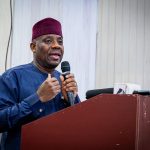The Vice President and Chief Economist of the World Bank, Mr. Indermit Gill, has called on the Bola Tinubu administration to continue with its economic reforms despite the hardships being experienced by many Nigerians.
Speaking at the opening session of the 30th Nigerian Economic Summit (#NES30) in Abuja, Gill stressed the importance of pushing forward with the reforms to ensure long-term economic growth. He praised the Central Bank of Nigeria (CBN) for its efforts in unifying exchange rates, a crucial step for stabilizing the economy.
Gill acknowledged the difficulties faced by Nigerians, particularly the poor and vulnerable, due to the ongoing reforms, and urged the government to implement cost-effective safety nets to protect those most affected.
“The reforms are necessary to unlock the potential of Nigeria’s economy and that of Sub-Saharan Africa. Though they are painful now, they are the key to future prosperity,” he stated.
He pointed out that similar reforms in countries like Norway, Poland, and Korea had paved the way for substantial economic growth, noting, “These things are incredibly challenging, but the rewards are enormous.”
Reflecting on Nigeria’s past reforms, Gill said, “Nigeria’s reforms from 2003 to 2007 were exactly what was needed; however, they weren’t sustained. The current fiscal and monetary reforms are hurting everyone, especially ordinary Nigerians, who are facing high food and transport costs.”
He further emphasized the urgency of protecting vulnerable citizens: “The government must do everything in its power to protect the most vulnerable citizens from hardships because their lives, along with the lives of 110 million children, depend on it.”
Gill also outlined three key priorities for Nigerian policymakers: prioritizing non-oil exports, building foreign reserves to buffer against oil price fluctuations, and creating jobs to absorb the 12 million Nigerians who will join the workforce in the next decade.
He highlighted the importance of supporting vulnerable households through cost-effective safety nets, funded by savings from fuel subsidy removals and exchange rate adjustments.





